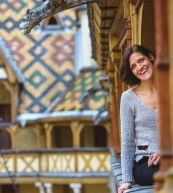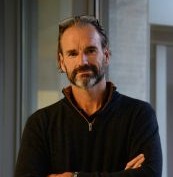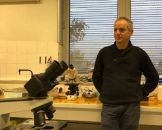Scientific mediation session
Theme: microbiota, vines and wine
Wednesday 19 November from 5pm to 6.30pm
This scientific mediation session will feature a testimonial from Ludivine Griveau, head of the Hospices de Beaune department store, as well as 3 scientific talks by Sophie Trouvelot, Lionel Ranjard and Hervé Alexandre.
Ludivine Griveau-Gemma :

Ludivine Griveau-Gemma is a key figure in the Burgundy wine world. Since 2015, she has been steward of the Domaine des Hospices de Beaune, becoming the first woman to run this prestigious estate. She has been a knight of the Confrérie du Tastevinage since 2016 and of the Ordre National du Mérite since 2024. Her role is multifaceted: she oversees the precision viticulture of 60 hectares spread over more than 120 plots, while also ensuring the vinification of the cuvées that will be sold at auction.
Ludivine Griveau-Gemma hails from Tournus (71). Although she does not come from the world of wine, she has a degree in oenology from the Institut de la Vigne et du Vin Jules Guyot at Burgundy University. She acquired solid experience in several Burgundy wine houses before taking up the reins at Hospices de Beaune. Ludivine Griveau-Gemma is deeply committed to the work that goes into being estate manager. Her approach combines respect for the terroir, innovation and adaptation to climatic challenges, notably with the conversion of the estate to organic farming from the 2024 vintage.
Passionate and rigorous, she embodies a new generation of committed winemakers, promoting the quality and authenticity of Hospices de Beaune wines. Her meticulous work and attention to detail have enabled the estate's wines to gain in recognition and excellence, vintage after vintage.
Sophie Trouvelot :

Sophie Trouvelot has been a lecturer and researcher at the Institut Universitaire de la Vigne et du Vin (Université Bourgogne Europe) since 2009, where she is responsible for the first year of the Master's degree in Vine, Wine and Terroir and was elected to the Conseil National des Université (section 68: Biology of Organisms). She carries out her research work at the UMR Agroécologie in Dijon, in the “Plant-Microorganism Interactions” unit and the “Vine Immunity: Mechanisms and Stimulation” team.
Her research aims to study the responses of the vine holobiont in contrasting health situations (asymptomatic productive vines vs. vines affected by decline) and to optimise vine health using agroecological practices (biocontrol, biostimulation and mycorrhization in particular).
During her studies, she worked on mycorrhisation in grapevines and then on the molecular determinism of the antagonistic power of a strain of Fusarium oxysporum. She then became interested in the immune responses of grapevines to various cryptogamic diseases (downy mildew, powdery mildew, grey rot and wood diseases more specifically). In this context, she has contributed to the definition of markers (molecular, histological and phenotypic) of vine health, whether the plant is grown in controlled conditions (growth chambers, greenhouses) or in production situations (vineyard). It is also testing their relevance and robustness in the face of different constraints (both biotic and abiotic) or stimuli (biosolutions). In a more integrative and holistic approach to the cultivated plant, she then became interested in the vine holobiont as a physiological functioning unit, combining both the plant component (host) and all the micro-organisms with which it interacts and can live in symbiosis (commensalism, mutualism and parasitism). Thus, since 2017, it has been seeking to define functional bioindicators, both plant and microbial, of the vine holobiont and the viticultural practices that would preserve its optimal and sustainable functioning.
In 2017, she received the Prix Scientifique from the Monique and André Boisseaux endowment fund to reward and support her research into vine decline (wood diseases).
Lionel Ranjard

Lionel Ranjard holds a PhD in soil microbial ecology from the Université Claude Bernard Lyon 1. He joined INRAE in Dijon in 2001 as a member of the Soil and Environmental Microbiology research unit. At INRAE, he adapted the tools and concepts he had developed in his thesis to study soil biodiversity in agrosystems and the impact of agricultural practices. Over the last 20 years, he has developed the Microbial Biogeography theme by applying soil metagenomic tools to the RMQS (Réseau de Mesures de la Qualité des Sols). This approach has enabled him to characterise the diversity of microbial communities across France, address the ecological processes involved in the large-scale distribution of microbial communities and generate a national atlas of the microbial diversity of French soils. At the same time, he has taken advantage of the opportunity to work on a large number of soils to validate molecular tools for characterising soil microbial diversity as a robust bio-indicator of soil quality. Since 2010, he has been developing participatory science projects directly with farmers to train and equip them in soil biology so that they can change their practices in the context of the agro-ecological transition. More recently, he coordinated the EcoVitiSol participatory project, which assessed the impact of wine-growing practices and production methods on soil microbiological quality in three wine-growing regions (Alsace, northern and southern Burgundy, Côtes de Provence, Gironde and Cognac). To date, he has published over 140 international scientific articles and given over 200 scientific and general public presentations.
Hervé Alexandre

Hervé Alexandre is Professor of Microbiology and Oenology at the Institut Universitaire de la Vigne et du Vin Jules Guyot at the Université Bourgogne Europe. He is head of the AFIM team at the UMR Food and Microbiological Processes. The aim of his research is to decipher the nature of the interaction mechanisms between microorganisms present in the microbial consortia of wine. Understanding the nature of these interactions will ultimately make it possible to control the expression of microbial functionalities of interest in a complex product by understanding the interactions of micro-organisms with the components that make up the manufacturing process: the raw material and the technological route.
He is the author of more than 160 scientific publications and book chapters. He is an expert with the International Organisation of Vine and Wine and the scientific delegate in microbiology for France within this body.
Title of guest lecture: What can we learn from our knowledge of the wine microbiota?
